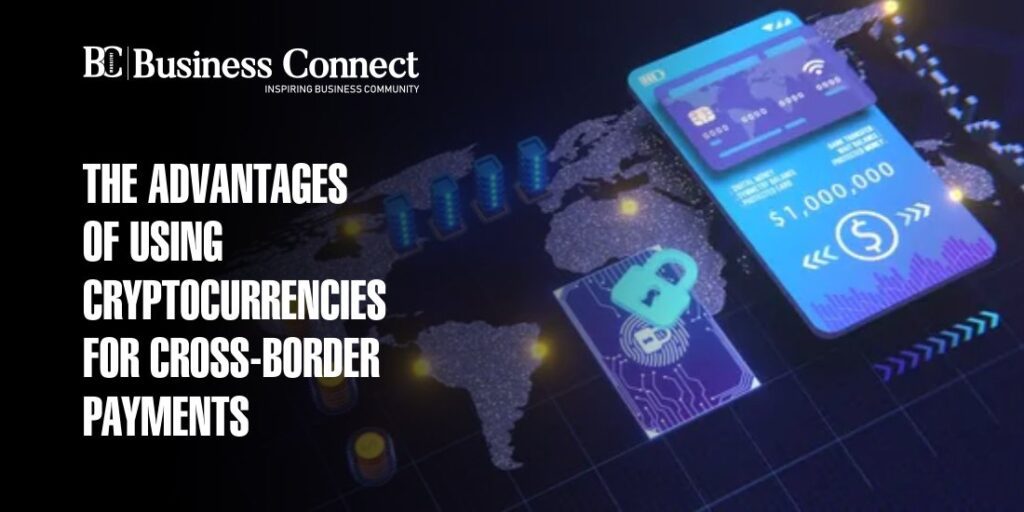THE ADVANTAGES OF USING CRYPTOCURRENCIES FOR CROSS-BORDER PAYMENTS
In today’s fast-paced world, transactions must be efficient, secure, and transparent. Blockchain technology has quickly become an essential tool for various industries, and it promises to revolutionize how we conduct transactions. Sign up on immediate-gpt.org to start Bitcoin trading and access a user-friendly interface, real-time market data, and expert insights that can help you make informed investment decisions in the cryptocurrency space.
There are numerous benefits obtained with this technology, such as fast and profitable transactions, greater security and privacy measures, eliminating the need for intermediaries, accessibility and global acceptance, and transparency and traceability at every step.
Unlike traditional transactions that involve intermediaries like banks, blockchain transactions are peer-to-peer and do not require intermediaries. It means transactions can be completed in seconds or minutes, depending on network congestion.
This technology is also known for its high security and privacy measures. Transactions on the blockchain are cryptographically protected, which means they are virtually inviolable.
Blockchain transactions are pseudonymous, which means they do not reveal the user’s personal information. That protects users’ privacy and makes it more difficult for hackers to steal your identity or funds.
Finally, blockchain technology offers transparency and traceability at every step. Once a transaction is recorded on the blockchain, it is transparent and can be viewed by anyone.
It makes tracking and tracing transactions easier, ensuring they are legitimate and following rules and regulations. In addition, blockchain technology enables the tracking and tracing of products and services, providing users with a complete history of the journey of a product or service.
Fast and profitable transactions
One of the most significant advantages of blockchain technology is its ability to facilitate fast and profitable transactions. Unlike traditional transactions that involve intermediaries like banks, blockchain transactions are peer-to-peer and do not require intermediaries.
This means transactions can be completed in seconds or minutes, depending on network congestion.
Because blockchain transactions are decentralized, no transaction fees are charged by intermediaries. Making them cost-effective, especially for individuals and businesses doing high-volume transactions, even eliminating the need for third-party payment processors, further reducing costs.
Benefit from enhanced security and privacy measures
Another aspect for which the blockchain is known is its high security and privacy measures. Transactions on the blockchain are cryptographically protected, which means they are virtually inviolable. Once a transaction is validated and recorded on the blockchain, it cannot be modified or deleted.
On the other hand, blockchain transactions are pseudonymous, meaning they do not reveal the user’s personal information. This protects users’ privacy and makes it more difficult for hackers to steal your identity or funds.
In other words, users have complete control over their transactions and can confidently trade.
Eliminating intermediaries reduces the risk of fraud and corruption. With traditional transactions, there is always the risk that intermediaries will manipulate the transaction to their advantage. Blockchain technology eliminates this risk by ensuring that transactions are transparent and immutable.
Blockchain allows global Access and Use with ease and acceptance
Blockchain technology is global and can be accessed and used by anyone, anywhere, quickly and acceptably. Because blockchain transactions are peer-to-peer, they do not require users to have a bank account or credit card.
This makes it easier for people in unbanked or underbanked regions to transact.
Moreover, it is accepted globally, meaning that users can transact with anyone, regardless of location.
This is especially beneficial for companies that operate in multiple countries and need to transact with suppliers, customers, and partners across borders.
Experience transparency and traceability at every step
Finally, blockchain technology offers transparency and traceability at every step. Once a transaction is recorded on the blockchain, it is transparent and can be viewed by anyone. It makes tracking and tracing transactions easier, ensuring they are legitimate and following rules and regulations.
The tracking and tracing of products and services is undoubtedly a critical point that provides users with a complete history of the journey of a product or service. It is especially beneficial for supply chain management, where transparency and traceability are critical.
Conclusion
Digital transactions have been transformed by executing quickly and cost-effectively, having greater security and privacy measures, and eliminating the need for intermediaries.
As blockchain technology continues to evolve, we can expect it to change how we transact.
Must Read:-
- Stock Market Update
- Top 10 shoe brands in India for men & women 2023
- Top 10 Adorable Gifts for Your Special One
- Top 10 Countries with Maximum Indian Population as Citizens
- Top 10 Small Business Statistics You Need to Know For 2023
- Top 10 highest-paid CEO in the World
- Top 10 richest person of India
- Top 10 Highest-Paid CEOs of India



